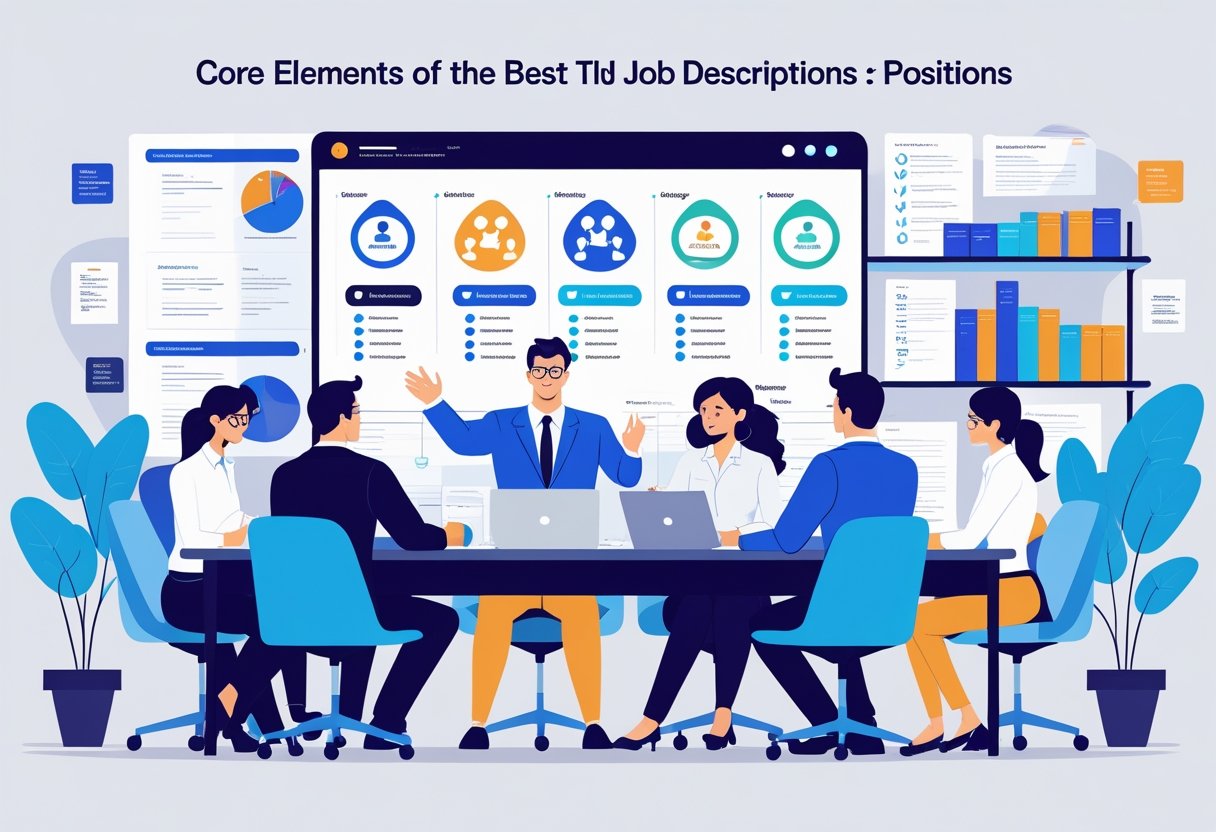Finding top sales talent starts with writing job descriptions that attract the right candidates. Many companies struggle to create postings that stand out in a competitive market.
Often, job postings miss key elements that skilled sales professionals look for when evaluating opportunities.

The most effective sales job descriptions combine clear role expectations, specific qualifications, and compelling company benefits. Highlighting growth opportunities and compensation structures motivates high performers.
These descriptions lay the groundwork for successful talent acquisition, setting proper expectations and filtering candidates efficiently.
Companies that master the art of writing effective sales job descriptions can boost their hiring success rates. Understanding the core components and tailoring descriptions for different sales roles helps organizations build stronger sales teams.
Core Elements of the Best Job Descriptions for Sales Positions

Effective sales job descriptions must clearly define the specific role within the sales hierarchy. Outlining precise responsibilities that align with business objectives is key.
The most successful descriptions also highlight the critical skills needed for sales professionals to meet targets and build lasting customer relationships.
Defining Sales Roles and Hierarchies
Sales organizations rely on clearly defined roles to operate smoothly. A well-crafted job description starts with a clear and engaging job title that reflects the position’s responsibilities and seniority level.
Entry-Level Positions:
- Sales Development Representatives
- Inside Sales Associates
- Junior Account Executives
Mid-Level Positions:
- Account Managers
- Territory Sales Representatives
- Business Development Representatives
Senior-Level Positions:
- Senior Sales Managers
- Regional Sales Directors
- VP of Sales
Each sales role requires specific qualifications and experience levels. Entry-level positions typically focus on lead generation and prospecting.
Mid-level roles emphasize relationship building and quota achievement. Senior positions involve strategic planning and team leadership.
The sales professional job description should specify reporting relationships and career advancement opportunities within the organization.
Key Responsibilities and Duties
Sales representatives need to understand their core duties to succeed. Clearly outlining responsibilities helps candidates understand daily expectations and ensures alignment with the role.
Primary Responsibilities:
| Core Duty | Description |
|---|---|
| Prospecting | Identify and qualify new business opportunities |
| Relationship Management | Build and maintain client relationships |
| Sales Presentations | Deliver compelling product demonstrations |
| Closing Deals | Navigate negotiations and secure contracts |
| Target Achievement | Meet monthly and quarterly sales quotas |
Sales professionals must generate leads through various channels. They conduct needs assessments and present solutions that address customer pain points.
Following up with prospects requires consistent communication and strong time management. Sales representatives track their activities using CRM systems and report results to management.
Customer satisfaction is a priority throughout the sales process. Representatives must provide excellent customer service while working toward sales goals.
Essential Sales Skills and Competencies
Successful sales professionals need a blend of technical abilities and soft skills. These competencies directly impact their ability to achieve sales targets and maintain strong customer relationships.
Communication Skills:
- Active listening techniques
- Clear verbal presentation abilities
- Written communication proficiency
- Negotiation expertise
Interpersonal Skills:
- Relationship building capabilities
- Emotional intelligence
- Conflict resolution abilities
- Team collaboration skills
Strong presentation skills enable representatives to deliver compelling demos. They must articulate value propositions and address objections effectively.
Time management is crucial for juggling multiple prospects and accounts. Sales professionals focus on activities that yield the highest ROI.
Technical sales skills include CRM proficiency and deep product knowledge. Representatives must understand their offerings to position solutions appropriately.
Customer service orientation helps maintain relationships beyond the initial sale. This approach leads to repeat business and referral opportunities.
Sales Position Types and Their Unique Job Descriptions

Each sales position serves a specific function within the sales department, from initial lead generation to long-term client management. Roles range from entry-level representatives who prospect for new customers to specialized engineers handling technical sales processes.
Sales Representative and Sales Development Representative
Sales representatives form the backbone of most sales departments. They focus on prospecting, qualifying leads, and closing deals with new customers.
Their job descriptions often include cold calling, product demos, and hitting monthly sales quotas. Sales development representatives (SDRs) specialize in the early stages of the sales process.
They generate leads through outbound activities and qualify prospects before passing them to account executives. SDRs spend most of their time on phone calls, emails, and social media outreach.
Key responsibilities for sales reps include:
- Identifying potential customers through research and networking
- Conducting product presentations and demos
- Negotiating contracts and pricing
- Maintaining customer records in CRM systems
Sales development rep job descriptions focus more on lead qualification activities. They ask discovery questions to understand prospect needs and schedule meetings for senior sales team members.
Both roles require strong communication skills and resilience. Different types of sales positions vary in their specific requirements, but these entry-level roles provide excellent training ground for future sales leaders.
Account Executives and Account Managers
Account executives handle the middle and closing stages of complex sales cycles. They work with qualified leads from sales development representatives and guide prospects through detailed product evaluations.
Their job descriptions emphasize relationship building and deal negotiation skills. Account managers focus on existing customer relationships after the initial sale.
They ensure customer success by providing ongoing support and identifying expansion opportunities. These roles bridge the gap between sales and customer success teams.
Account executive responsibilities:
- Managing sales pipeline and forecasting revenue
- Conducting advanced product demonstrations
- Negotiating complex contracts and terms
- Collaborating with sales operations and marketing teams
Account managers have different priorities in their job descriptions. They monitor customer health scores and renewal dates.
They also work closely with sales operations managers to track account performance metrics. Both positions require deep product knowledge and industry expertise.
Account executives need strong closing skills, while account managers excel at retention and growth within existing accounts.
Sales Manager and Director Roles
Sales managers oversee day-to-day operations of sales teams. Their job descriptions include coaching individual contributors, managing sales processes, and ensuring team members meet their quotas.
They typically manage 5-10 direct reports across various sales positions. Sales directors and director of sales roles focus on strategic planning and department leadership.
They work with senior leadership to set revenue targets and sales strategies. These positions require experience in sales operations and revenue operations.
Management responsibilities include:
- Hiring and training new sales team members
- Setting individual and team performance goals
- Analyzing sales data and pipeline metrics
- Coordinating with sales operations and marketing
Sales leadership positions demand both tactical and strategic thinking. Managers focus on day-to-day team performance while directors handle long-term planning.
Both roles require strong analytical skills to interpret sales data and market trends. Revenue operations experience becomes crucial at director levels.
These leaders must understand complex sales processes and technology systems supporting the sales department.
Specialized Positions: Sales Engineer and Sales Consultant
Sales engineers combine technical expertise with selling skills. Their job descriptions require deep product knowledge and the ability to explain complex technical solutions.
They typically support account executives during technical demonstrations and proof-of-concept phases. Sales consultants take a more advisory approach to selling.
They focus on understanding customer business challenges and recommending solutions. These roles often require industry-specific expertise and consulting experience.
Technical sales roles involve:
- Conducting technical product demonstrations
- Designing custom solutions for prospects
- Supporting implementation and integration projects
- Training customer technical teams
Sales engineers work closely with product development and engineering teams. They provide customer feedback to improve products and create technical documentation.
Their job descriptions often require engineering backgrounds or technical certifications. Sales consultants focus more on business outcomes than technical features.
They conduct needs assessments and develop business cases for their solutions. Specialized sales positions require specific industry knowledge and problem-solving skills.
Both roles command higher salaries than traditional sales positions due to their specialized expertise.
Qualifications, Training, and Experience Requirements
Most sales positions require a bachelor’s degree in business-related fields. Experience levels vary from entry-level to senior roles requiring 5+ years.
Companies increasingly invest in ongoing sales training to keep teams current with industry trends and evolving sales methodologies.
Education and Degree Expectations
Sales professionals typically need a bachelor’s degree in business administration, marketing, or related fields. These programs provide foundational knowledge in economics, business law, and management principles.
Common degree fields include:
- Business Administration
- Marketing
- Communications
- Economics
- Psychology
Some specialized industries require specific educational backgrounds. Technical sales roles often demand engineering or science degrees.
While formal education matters, many companies prioritize skills and experience over degrees. Entry-level candidates can sometimes substitute relevant experience for formal qualifications.
Desired Sales Experience
Experience requirements vary significantly based on position level and industry complexity. Entry-level roles typically seek 1-2 years of customer service or sales experience.
Experience progression typically follows:
| Experience Level | Years | Typical Roles |
|---|---|---|
| Entry-level | 0-2 years | Sales Representative, Sales Associate |
| Mid-level | 3-5 years | Account Manager, Sales Specialist |
| Senior-level | 5+ years | Sales Manager, Director of Sales |
Companies value proven track records of meeting or exceeding sales targets. Candidates with industry-specific experience often receive preference.
Internships and part-time sales roles provide valuable foundational experience. These positions help candidates understand buyer behavior and negotiation techniques.
Ongoing Sales Training and Development
Modern sales environments require continuous learning to stay competitive. Companies invest heavily in sales training programs to maintain team effectiveness.
Key training areas include:
- CRM software proficiency
- Industry trends analysis
- Market trends understanding
- Advanced negotiation techniques
- Digital sales tools
Professional certifications enhance career prospects, including Certified Professional Sales Person (CPSP) and Certified Sales Leadership Professional (CSLP). These credentials show commitment to professional development.
Sales teams regularly attend conferences, trade shows, and industry events. These activities provide networking opportunities and exposure to emerging market trends.
Technology training is increasingly important as sales processes digitize. Representatives must master video conferencing, social selling, and automated lead generation tools.
Best Practices for Crafting Effective Sales Job Descriptions
Successful sales job descriptions must connect directly to company revenue targets. They should also reflect current market conditions and evolving sales methodologies to attract adaptable candidates.
Aligning Descriptions with Company and Revenue Goals
Sales job descriptions perform best when they clearly connect individual performance to company growth objectives. This alignment helps candidates understand their impact on business success.
Companies should include specific revenue targets and quota expectations in their job postings. For example, “achieve $2M in annual sales revenue” or “exceed quarterly targets by 15%” gives candidates concrete benchmarks.
Key elements to include:
- Annual or quarterly sales quotas
- Territory size and revenue potential
- Commission structure tied to company goals
- Growth percentage expectations
The sales process should be outlined to show how individual activities contribute to broader business development. This includes prospecting requirements, pipeline management expectations, and account management responsibilities.
Sales reports and metrics tracking should be mentioned to demonstrate accountability. Candidates need to know they’ll monitor their progress through CRM systems and regular performance reviews.
Outside sales roles require different goal alignment than inside positions. Territory management and travel expectations must connect to regional revenue objectives and new business opportunities in specific markets.
Highlighting Customer Needs and Relationship Building
Modern sales roles now focus on understanding and solving customer problems instead of just pushing products. Job descriptions should highlight relationship-building skills and customer-centric approaches.
Successful postings showcase the importance of customer needs assessment and consultative selling techniques. They should mention activities like conducting discovery calls and presenting tailored solutions.
Maintaining long-term client relationships is key. Essential relationship-focused responsibilities include conducting customer needs analysis and building trust through solution selling.
Managing existing account relationships and developing customer success strategies are also important. Account management duties should be clearly explained in job descriptions.
Companies need to specify if candidates will manage existing accounts, develop new territories, or handle both. Customer relationships go beyond the initial sale to include post-purchase support and expansion opportunities.
Job descriptions should mention cross-selling, upselling, and customer retention activities. Using specific examples of customer interaction scenarios helps candidates picture their daily tasks and relationship-building responsibilities.
Adapting to Evolving Sales Strategies and Market Trends
Sales strategies are always changing, thanks to new tech and shifts in buyer behavior. Job descriptions should highlight current sales methodologies and future-ready competencies to attract adaptable talent.
Digital selling skills are now essential in most industries. Make sure to list social selling, virtual presentation skills, and CRM expertise as must-have requirements.
Modern sales strategy elements:
Business development now blends traditional outreach with digital tactics. Trade shows still matter, but online networking and virtual events are just as important to mention in your job postings.
It’s key to address hybrid and remote selling skills. Sales professionals need to thrive in both face-to-face meetings and virtual environments.
Market trends impact sales cycle length and what customers expect. Job descriptions should call out adaptability to shifting market conditions and openness to adjusting sales approaches as the industry evolves.
Stay current by regularly updating your sales job postings to reflect new requirements and opportunities. This helps attract excellent candidates who are ready for what’s next.
-

A passionate advocate for the future of HR innovation. With expertise in leveraging AI to revolutionize recruitment processes, Carlos has a clear vision: empower HR teams while creating meaningful candidate experiences.
View all posts



